高一英语人教版必修三Unit5+Warming+up+教案.doc
- 格式:doc
- 大小:40.61 KB
- 文档页数:3
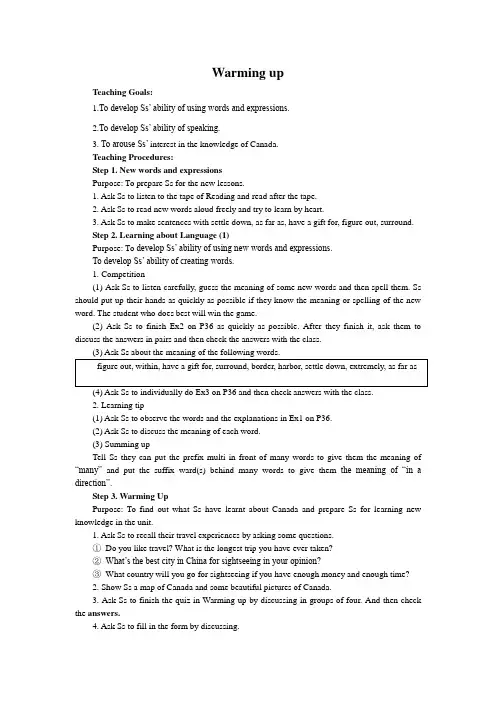
Warming upTeaching Goals:1.To develop Ss’ ability of using words and expressions.2.To develop Ss’ ability of speaking.3. To arouse Ss’ interest in the knowledge of Canada.Teaching Procedures:Step 1. New words and expressionsPurpose: To prepare Ss for the new lessons.1. Ask Ss to listen to the tape of Reading and read after the tape.2. Ask Ss to read new words aloud freely and try to learn by heart.3. Ask Ss to make sentences with settle down, as far as, have a gift for, figure out, surround.Step 2. Learning about Language (1)Purpose: To develop Ss’ ability of using new words and expressions.To develop Ss’ ability of creating words.1. Competition(1) Ask Ss to listen carefully, guess the meaning of some new words and then spell them. Ss should put up their hands as quickly as possible if they know the meaning or spelling of the new word. The student who does best will win the game.(2) Ask Ss to finish Ex2 on P36 as quickly as possible. After they finish it, ask them to discuss the answers in pairs and then check the answers with the class.2. Learning tip(1) Ask Ss to observe the words and the explanations in Ex1 on P36.(2) Ask Ss to discuss the meaning of each word.(3) Summing upTell Ss they can put the prefix multi in front of many words to give them the meaning of “many”and put the suffix ward(s) behind many words to give them the meaning of “in a direction”.Step 3. Warming UpPurpose: To find out what Ss have learnt about Canada and prepare Ss for learning new knowledge in the unit.1. Ask Ss to recall their travel experiences by asking some questions.①Do you like travel? What is the longest trip you have ever taken?②What’s the best city in China for sightseeing in your opinion?③What country will you go for sightseeing if you have enough money and enough time?2. Show Ss a map of Canada and some beautiful pictures of Canada.3. Ask Ss to finish the quiz in Warming up by discussing in groups of four. And then check the answers.4. Ask Ss to fill in the form by discussing.Answers:(1) North America (2) South (3) Second (4) English and French (5) climateStep 4. TalkingPurpose: To develop Ss’ ability of speaking.1. ActivityAsk Ss some simple questions by revising the form finished above.2. Pair work(1) Ask Ss to make up a dialogue in pairs by imitating the above dialogue between the teacher and the Ss.(2) Ask two pairs of the Ss to act out the dialogue in front of the class.(3) Ask Ss to make up a dialogue according to the information given in the form above and the reference given below. Then ask a pair of the Ss to act it out.Step 5. Homework1. Ask Ss to revise new words and expressions in this unit and finish the exercises in Using Words And Expressions (Workbook).2. Ask Ss to use the phrases in Talking (Workbook) to make a brief dialogue.品味人生1、不管鸟的翅膀多么完美,如果不凭借空气,鸟就永远飞不到高空。
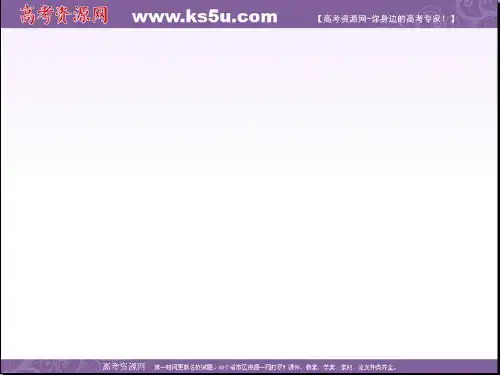
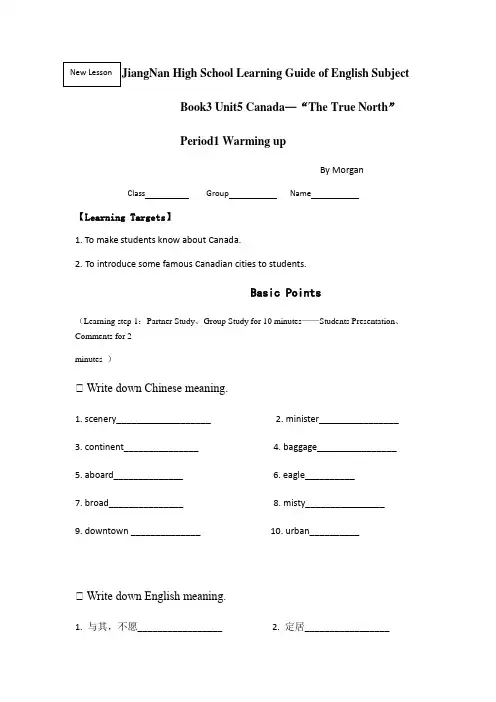
JiangNan High School Learning Guide of English SubjectBook3 Unit5 Canada—“The True North”Period1 Warming upBy MorganClass Group Name【Learning Targets】1. To make students know about Canada.2.To introduce some famous Canadian cities to students.Basic Points(Learning step 1:Partner Study、Group Study for 10 minutes——Students Presentation、Comments for 2minutes )Ⅰ Write down Chinese meaning.1. scenery___________________2. minister________________3. continent_______________4. baggage________________5. aboard______________6. eagle__________7. broad_______________ 8. misty________________9. downtown ______________ 10. urban__________Ⅰ Write down English meaning.1. 与其,不愿_________________2. 定居_________________3. 设法做_______________________4. 看见;瞥见__________________5. 有……天赋_____________________6. 测量______________7. 聊天________________ 8. 边界;国界__________________ 9. 包围____________________ 10. 在远处_________________ 11. 混合_________________ 12.证实_______________________ 13. 距离__________________ 14. 在附近____________________ 15. 传统______________ 16. 使…印象深刻______________ 17. adj. 欢喜的_______________ 18. adj. 恐惧的____________ 19. adj. 富有的_____________ 20. adj. 轻微的_______________Main Points(Learning step 2:Partner Study、Group Study for 8 minutes——Teacher’s assignment,Groups exploration for3 minutes——Presentation and comments for 14 minutes )1. Which is the national flag of Canada?A BC D2. What language(s) do Canadians speak?A. English.B. English and German.C. English and French.D. English and Spanish.3. What is the capital of Canada?A.the warmest and most beautiful cityB.the biggest city Vancouver (温哥华) Toronto (多伦多)C. Calgary (卡尔加里)D. Ottawa (渥太华)4. What is the national animal of Canada?A. Beaver.B. Grizzly bear.C. Polar bear.D. Penguin.5. Canada is the ______ largest countryin the world.A. 2ndB. 3rdC. 4thD. 5thExpand PointsTry to translate these sentences.1.游览加拿大一直是我们的梦想。
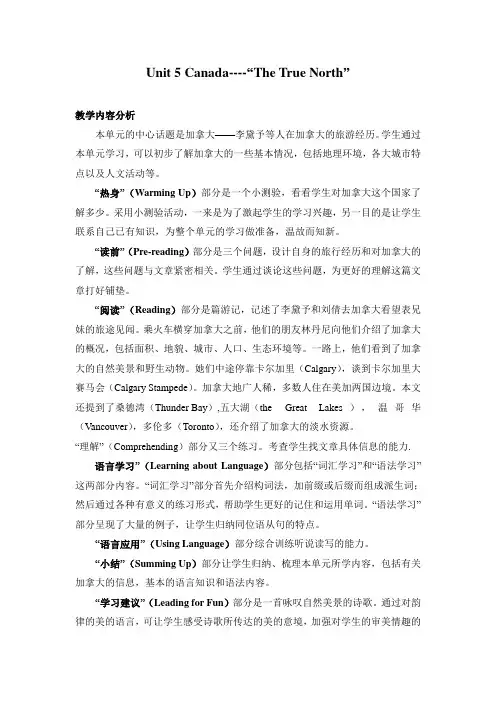
Unit 5 Canada----“The True North”教学内容分析本单元的中心话题是加拿大——李黛予等人在加拿大的旅游经历。
学生通过本单元学习,可以初步了解加拿大的一些基本情况,包括地理环境,各大城市特点以及人文活动等。
“热身”(Warming Up)部分是一个小测验,看看学生对加拿大这个国家了解多少。
采用小测验活动,一来是为了激起学生的学习兴趣,另一目的是让学生联系自己已有知识,为整个单元的学习做准备,温故而知新。
“读前”(Pre-reading)部分是三个问题,设计自身的旅行经历和对加拿大的了解,这些问题与文章紧密相关。
学生通过谈论这些问题,为更好的理解这篇文章打好铺垫。
“阅读”(Reading)部分是篇游记,记述了李黛予和刘倩去加拿大看望表兄妹的旅途见闻。
乘火车横穿加拿大之前,他们的朋友林丹尼向他们介绍了加拿大的概况,包括面积、地貌、城市、人口、生态环境等。
一路上,他们看到了加拿大的自然美景和野生动物。
她们中途停靠卡尔加里(Calgary),谈到卡尔加里大赛马会(Calgary Stampede)。
加拿大地广人稀,多数人住在美加两国边境。
本文还提到了桑德湾(Thunder Bay),五大湖(the Great Lakes),温哥华(Vancouver),多伦多(Toronto),还介绍了加拿大的淡水资源。
“理解”(Comprehending)部分又三个练习。
考查学生找文章具体信息的能力.语言学习”(Learning about Language)部分包括“词汇学习”和“语法学习”这两部分内容。
“词汇学习”部分首先介绍构词法,加前缀或后缀而组成派生词;然后通过各种有意义的练习形式,帮助学生更好的记住和运用单词。
“语法学习”部分呈现了大量的例子,让学生归纳同位语从句的特点。
“语言应用”(Using Language)部分综合训练听说读写的能力。
“小结”(Summing Up)部分让学生归纳、梳理本单元所学内容,包括有关加拿大的信息,基本的语言知识和语法内容。
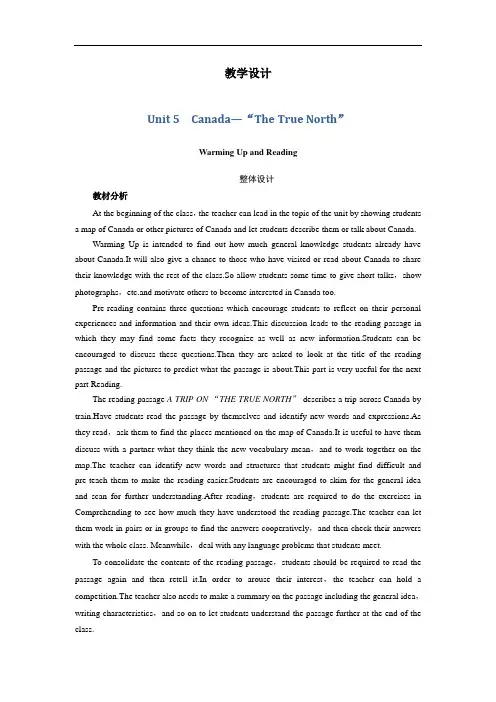
教学设计Unit 5Canada—“The True North”Warming Up and Reading整体设计教材分析At the beginning of the class,the teacher can lead in the topic of the unit by showing students a map of Canada or other pictures of Canada and let students describe them or talk about Canada.Warming Up is intended to find out how much general knowledge students already have about Canada.It will also give a chance to those who have visited or read about Canada to share their knowledge with the rest of the class.So allow students some time to give short talks,show photographs,etc.and motivate others to become interested in Canada too.Pre-reading contains three questions which encourage students to reflect on their personal experiences and information and their own ideas.This discussion leads to the reading passage in which they may find some facts they recognize as well as new information.Students can be encouraged to discuss these questions.Then they are asked to look at the title of the reading passage and the pictures to predict what the passage is about.This part is very useful for the next part Reading.The reading passage A TRIP ON“THE TRUE NORTH” describes a trip across Canada by train.Have students read the passage by themselves and identify new words and expressions.As they read,ask them to find the places mentioned on the map of Canada.It is useful to have them discuss with a partner what they think the new vocabulary mean,and to work together on the map.The teacher can identify new words and structures that students might find difficult and pre-teach them to make the reading easier.Students are encouraged to skim for the general idea and scan for further understanding.After reading,students are required to do the exercises in Comprehending to see how much they have understood the reading passage.The teacher can let them work in pairs or in groups to find the answers cooperatively,and then check their answers with the whole class. Meanwhile,deal with any language problems that students meet.To consolidate the contents of the reading passage,students should be required to read the passage again and then retell it.In order to arouse their interest,the teacher can hold a competition.The teacher also needs to make a summary on the passage including the general idea,writing characteristics,and so on to let students understand the passage further at the end of the class.教学重点1.Let students read the passage and learn about the geography,population,main cities,natural beauty and natural resources of Canada.2.Get students to learn different reading skills.教学难点1.Develop students' reading ability.2.Enable students to learn about some basic information and talk about Canada.三维目标知识目标1.Get students to learn the useful new words and expressions in this part.2.Let students learn the knowledge of Canada.能力目标1.Develop students' reading ability and let them learn different reading skills.2.Let students learn how to read a traveling report and how to use a map.2.Enable students to learn about some basic information and talk about Canada.情感目标1.Stimulate students' interest in learning about foreign countries.2.Develop students' sense of cooperative learning.教学过程设计方案(一)Step 1 Leading-in and Warming up1.Show a map of Canada to students and talk about Canada.Then ask them the following questions:1)What kind of country is Canada?2)How large is it?3)What else do you know about Canada?Suggested answers:1)Canada is a multicultural country.2)It's the second largest country in the world.It covers an area of 9 984 670 square kilometers.It is a bit bigger than China.3)(Students' answer may vary.Encourage them to tell more information.)2.Make a quizShow the following on the screen.2.Have students turn to Page 34 of the text book,look at the title of the reading passage and the pictures and predict what the passage is about.Then have them read the passage quickly to see if they are right.Step 3 Reading1.Fast readingAsk students to skim the reading passage and then answer the following questions:1)What is the passage mainly about?2)What is “The True North”?3)How many cities are mentioned in the text?What are they?Three minutes later,check the answers with the whole class.Suggested answers:1)The passage is about a trip of two girls,and it tells us some information about Canada.2)“The True North” is the train that goes across Canada/the cross-Canada train.3)Five.They are Montreal,Vancouver,Calgary,Thunder Bay and Toronto.2.Intensive readingAllow students to read the passage carefully this time to understand the main idea of each paragraph and get the important details,and then finish the following:1)Choose the best answer to each question according to the text.(1)As you go eastward,you can see the following things except ______.A.mountains B.thousands of lakesC.forests and wide rivers D.cows(2)Who will take part in the Calgary Stampede?A.Cowboys from Stampede.B.People from Canada.C.Anyone who has a gift for riding.D.Cowboys from all over the world.(3)Which of the following statements is true?A.One can cross Canada in less than five days by train.B.Many people think Calgary is the most beautiful city in Canada.C.In fact,the population of Canada is more than thirty million.D.Ocean ships cannot reach Thunder Bay.(4)Which of the following shows the right route of the cousin's travel?A.Toronto→Calgary→Vancouver→Thunder BayB.Vancouver→Calgary→Thunder Bay→TorontoC.Vancouver→Thunder Bay→Calgary→TorontoD.Toronto→Thunder Bay→Calgary→VancouverSuggested answers:(1)D(2)D(3)C(4)B2)Use the information from the reading passage to fill in the table below.3)(1)Which continent are the cousins crossing?(2)Why are they not flying directly to the Atlantic coast?(3)Why is the population of Vancouver growing so rapidly?(4)What happens at the Calgary Stampede?(5)How are ocean ships able to reach the center of Canada?(6)What are some of Canada's greatest natural resources?3.Reading and discussingRead the passage a third time and then work in pairs to discuss these questions.1)Which part of the reading passage interests you most?2)If someday you go to Canada,where will you go?Why?(Let students have enough time to read the passage carefully and discuss the questions with their partners.Encourage them to expand their answers according to their own experiences.)4.Dealing with language pointsHelp students analyze some difficult,long and complex sentences and guess the meanings of some new words and expressions.Encourage them to try to deal with the language points in the context.Give them explanations if necessary.5.Listening and reading aloudAsk students to read the passage aloud to the tape and let them pay attention to the pronunciation of each new word and the pauses within each sentence.Tell them to pick out all the useful expressions or collocations from the passage while reading and copy them to the notebook after class as homework.Read them aloud and try to learn them by heart.Collocations:be on a trip to,rather than,take the aeroplane,all the way,take the train,at the airport,on the way to,chat about,as well as,less than,aboard the train,settle down,manage to do,catch sight of,be famous for,have a gift for,thousands of,in prizes,be amazed to do,at the top of,be surprised at,because of,fresh waterStep 4 ConsolidationGive students 10 minutes or so and let them do the following:1.Work in pairs and fill in the table about the type of writing and summary of the idea.Suggested answers:while taking them to ______ the train,“The True North”.Having settled ______ in the seats,they looked out of the window ______ the wild scenery,the mountain goats,and grizzly bears.They went by the city of Calgary and ______ in Thunder Bay,a city at the ______of the Great Lakes,learning more about Canada of its population resources and so ______.Their last stop was Toronto,one of the southernmost cities in Canada.Keys:trip;all;train;for;introduction;biggest;catch;down;at;arrived;top;on Step 5 Homework1.Learn the useful new words and expressions in this part by heart.2.Read the reading passage again and try to retell the passage.设计方案(二)Step 1 Leading in the topicPlay the videos of the beautiful Canadian scenery.Enjoy them with students.Step 2 Warming UpAsk students to turn to Page 33.Let them work in pairs and answer this quiz to see how much they know about Canada.Step 3 Pre-readingShow students a map of Canada and let them discuss the following questions in pairs:1)If you take a trip to Canada,what do you think you might see there?2)What three words would you use to describe Canada?Step 4 Reading1.Give students 3 minutes and let them skim the passage to get the general idea of the passage.2.Give students 6 minutes to read the passage carefully and then do the following:1)Answer the following questions.(1)Which continent are the cousins crossing?(2)Why are they not flying directly to the Atlantic coast?(3)Why is the population of Vancouver growing so rapidly?bear5.Cowboys6.compete7.the top of8.port)3.Give students 4 minutes to read the passage a third time.Encourage them to try to deal with the language points in the context.Give them some explanations where necessary.4.Listening and reading aloudPlay the tape of the text for students and let them pay attention to the pronunciation of each new word and the pauses within each sentence.Then ask them to read the text aloud to the tape.Step 5 DiscussionLet students think about and discuss the following questions in pairs.1.Which part of the reading passage interests you most?2.If someday you go to Canada,where will you go?Why?Step 6 Closing down by retelling the passage1.Have students get prepared in 3 minutes or so and then ask them to retell the passage. 2.Ask as many students as possible to have a try in front of the class.Step 7 HomeworkGo over the text and try to learn all the useful words and expressions in this part by heart.。

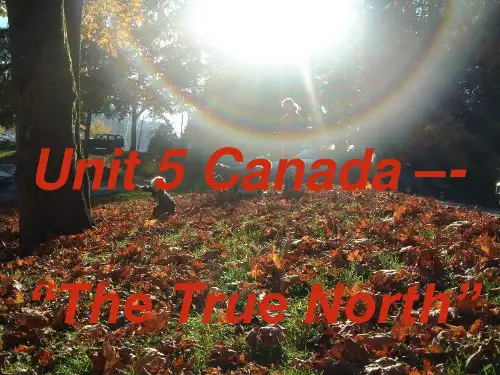
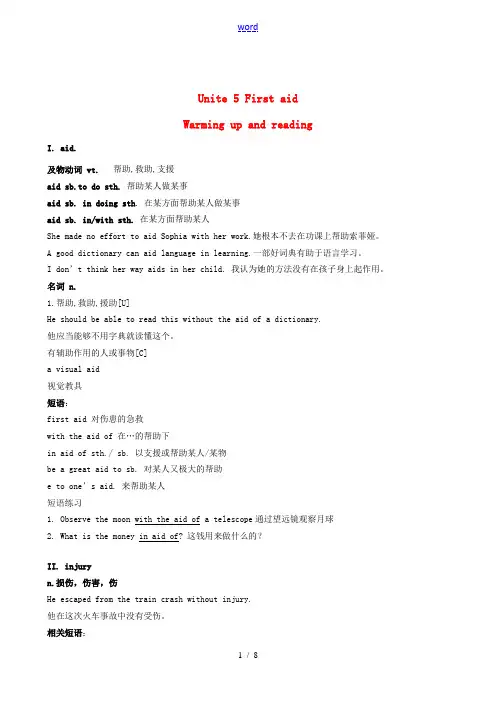
Unite 5 First aidWarming up and readingI. aid.及物动词 vt. 帮助,救助,支援aid sb.to do sth.帮助某人做某事aid sb. in doing sth. 在某方面帮助某人做某事aid sb. in/with sth.在某方面帮助某人She made no effort to aid Sophia with her work.她根本不去在功课上帮助索菲娅。
A good dictionary can aid language in learning.一部好词典有助于语言学习。
I don’t think her way aids in her child. 我认为她的方法没有在孩子身上起作用。
名词 n.1.帮助,救助,援助[U]He should be able to read this without the aid of a dictionary.他应当能够不用字典就读懂这个。
有辅助作用的人或事物[C]a visual aid视觉教具短语:first aid 对伤患的急救with the aid of 在…的帮助下in aid of sth./ sb. 以支援或帮助某人/某物be a great aid to sb. 对某人又极大的帮助e to one’s aid. 来帮助某人短语练习1. Observe the moon with the aid of a telescope通过望远镜观察月球2. What is the money in aid of? 这钱用来做什么的?II. injuryn.损伤,伤害,伤He escaped from the train crash without injury.他在这次火车事故中没有受伤。
相关短语:do sb. an injury / do an injury to 伤害某人 ,对…造成伤害be an injury to 伤害……,危害injure vt. 伤害 injured adj. 受伤的 the injured 伤员hurt/ wound/ injure/ harm主要用于由生命的东西,指"使人的肉体受伤而疼痛",或"伤了人的自尊心或感情"。
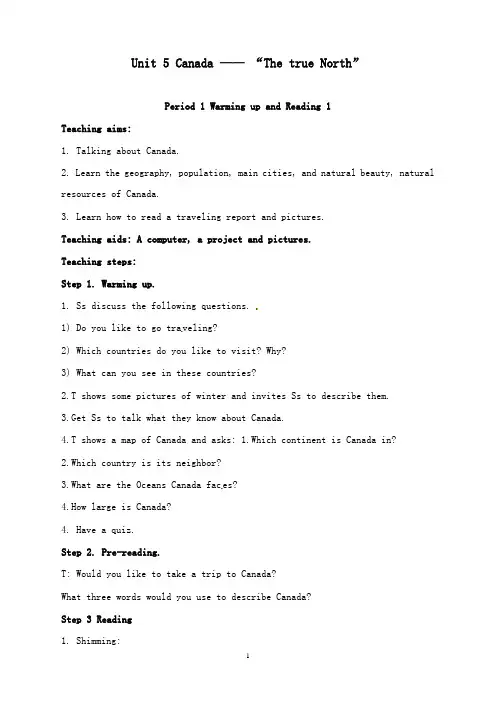
Unit 5 Canada ——“The true North”Period 1 Warming up and Reading 1Teaching aims:1. Talking about Canada.2. Learn the geography, population, main cities, and natural beauty, natural resources of Canada.3. Learn how to read a traveling report and pictures.Teaching aids: A computer, a project and pictures.Teaching steps:Step 1. Warming up.1. Ss discuss the following questions.1) Do you like to go tra veling?2) Which countries do you like to visit? Why?3) What can you see in these countries?2.T shows some pictures of winter and invites Ss to describe them.3.Get Ss to talk what they know about Canada.4.T shows a map of Canada and asks: 1.Which continent is Canada in?2.Which country is its neighbor?3.What are the Oceans Canada fac es?4.How large is Canada?4. Have a quiz.Step 2. Pre-reading.T: Would you like to take a trip to Canada?What three words would you use to describe Canada?Step 3 Reading1. Shimming:Get Ss to read the passage quickly and answer the following questions: 1) What is the passage mainly about?Sample:The passage is about a trip of two girls, and it tells us some information about Canada.2) What is “The Ture No rth”?Sample:“The True North” is the train that goes across Canada / the cross-Canada train.3) How many cities are mentioned in the text? What are they?Sample:Vancouver – Calgary—Thunder Bay—Toronto4) What do you know about each city?Vancouver :the warmest part of Canada; the most beautiful city in Canadamany Asian want to live there;the trees are extremely tall.the oldest and most beautiful forests in the worldCalgary:famous for StampedeCowboys come to compete in riding wild horses.good at working with animalsthey can win a lot of money in prizes.Thunder Bay:at the top end of the Great Lakes;very busy portclose to the centre of the country ,so that ocean ships can go there.2. Detailed reading:1) Get Ss to read the passage again and correct the following sentences.1. The girls went to Canada to see their relatives in Montreal.(in the East of Canada / on the Atlantic coast of Canada)2. Danny Lin was goi ng to drive them to Vancouver.(the train station to catch the cross-Canada train)3. You can cross Canada in less than five days by bicycle.(can’t)4. The girls looked out the windows and saw Native Indians and cowboys.(a grizzly bear, mountain goats and wild scenery)5. Thunder Bay is a port city in the south of Canada, near Toronto.(at the top end of the Great Lakes, near the center of the country)2) Listen to the tape and fill in the blanks from the text.Canada is _____ than the United States. It is the _______largest country in the world.It is _____ kilometers from coast to coast in Canada.The population of Canada is onl y slightly over_____________.Canada has _________ of the world’s fresh water, much of which is in the ___________.On the coast north of Vancouver some of the oldest and most beautiful _______ in the world still remain. It is so wet there that the trees are extremely ______.Period 2 Language points:1.Canada is a multicultural country like China. 加拿大像中国一样是一个多元化国家。
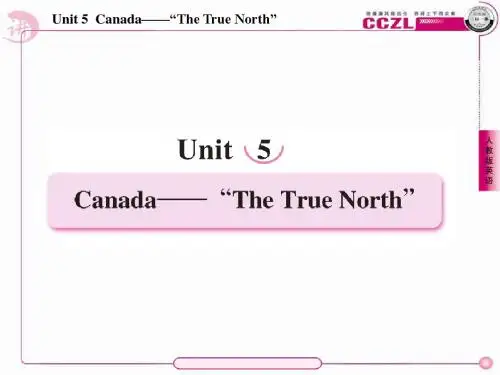

Unit 5Canada—“The True North”adv. 向上地; 上升地adj.向上的; 上升的n. 边界; 国界; 边沿vt. &vi. 与……接壤; 接近Period 1Warming up and reading整体设计教材分析This is the first teaching period of this unit, which introduces students to some basic information about Canada, its geography, its culture and its population. At the beginning of the class, the teacher can lead in the topic of the unit by showing students a map of Canada or other pictures of Canada and let the students describe them or talk about Canada.Warming Up is intended to find out how much general knowledge students already have about Canada. It will also give a chance to those who have visited or read about Canada to share their knowledge with the rest of the class. So allow students some time to give short talks, show photographs, etc. and motivate others to become interested in Canada too.Pre-reading contains three questions which encourage students to reflect on their personal experiences and information and their own ideas. This discussion leads to the reading passage in which they may find some facts they recognize as well as new information. Students can be encouraged to discuss these questions. Then they are asked to look at the title of the reading passage and the pictures to predict what the passage is about. This part is very useful for the next part Reading.The reading passage A TRIP ON “THE TRUE NORTH” describes a trip across Canada by train. Have students read the passage by themselves and identify new words and expressions. As they read, ask them to find the places mentioned on the map of Canada. It is useful to have them discuss with a partner what they think the new vocabulary mean, and to work together on the map. The teacher can identify new words and structures that students might find difficult and pre-teach them to make the reading easier. Students are encouraged to skim for the general idea and scan for further understanding. After reading, students are required to do the exercises in Comprehending to see how much they have understood the reading passage. The teacher can let them work in pairs or in groups to find the answers cooperatively, and then check their answers with the whole class. Meanwhile, deal with any language problems that students meet.To consolidate the contents of the reading passage, students should be required to read the passage again and then retell it. In order to arouse their interest, the teacher can hold a competition. The teacher also needs to make a summary on the passage including the general idea, writing characteristics, and so on to let students understand the passage further at the end of the class.教学重点1. Let students read the passage and learn about the geography, population, main cities, natural beauty and natural resources of Canada.2. Get students to learn different reading skills.教学难点1. Develop students’ reading ability.2. Enable students to learn about some basic information and talk about Canada.三维目标1. Get students to learn the useful new words and expressions in this part.2. Let students learn the knowledge of Canada.能力目标1. Develop students’ reading ability and let them learn differen t reading skills.2. Let students learn how to read a traveling report and how to use a map.2. Enable students to learn about some basic information and talk about Canada.情感目标1. Stimulate students’ interest in learning about foreign countries.2. Develo p students’ sense of cooperative learning.教学过程设计方案(一)→Step 1 Leading-in and warming up1. Show a map of Canada to students and talk about Canada. Then ask them the following questions:1)What kind of country is Canada?2)How large is it?3)What else do you know about Canada?Suggested answers:1)Canada is a multicultural country.2)It’s the second largest country in the world. It covers an area of 9 984 670 square kilometers. It is a bit bigger than China.3)(Students’ answer may vary. Encourage them to tell more information. )2. Make a quizHow much do you know about Canada?1. What language(s) do Canadians speak?A. English.B. English and German.C. English and French.D. English and Spanish.2. What is the capital of Canada?A. Vancouver.B. Toronto.C. Calgary.D. Ottawa.3. What is the national animal of Canada?A. Beaver.B. Grizzly bear.C. Polar bear.D. Penguin.4. What is the Canadian leader called?another pair. Give them the correct answers and see how many students got 80% or better.→Step 2 Pre-reading1. Let students discuss the following questions:1)What is the longest trip you have ever taken?2)If you take a trip to Canada, what do you think you might see there?3)What three words would you use to describe Canada?3. Have students turn to Page 34 of the text book, look at the title of the reading passage and the pictures and predict what the passage is about. Then have them read the passage quickly to see if they are right.→Step 3 Reading1. Fast readingAsk students to skim the reading passage and then answer the following questions:1)What is the passage mainly about?2)What is “The True North”?3)How many cities are mentioned in the text? What are they?Three minutes later, check the answers with the whole class.Suggested answers:1)The passage is about a trip of two girls, and it tells us some information about Canada.2)“The True North” is the train that goes across Canada/the cross-Canada train.3)Five. They are Montreal, Vancouver, Calgary, Thunder Bay and Toronto.2. Intensive readingAllow students to read the passage carefully this time to understand the main ideas of each paragraph and get the important details, and then finish the following:1)Choose the best answer to each question according to the text.(1)As you go eastward, you can see the following things except ______________.A. mountainsB. thousands of lakesC. forests and wide riversD. cows(2)Who will take part in the Calgary Stampede?A. Cowboys from Stampede.B. People from Canada.C. Anyone who has a gift for riding.D. Cowboys from all over the world.(3)Which of the following statements is true?A. One can cross Canada in less than five days by train.B. Many people think Calgary is the most beautiful city in Canada.C. In fact, the population of Canada is more than thirty million.D. Ocean ships cannot reach Thunder Bay.(4)Which of the following shows the right route of the cousin’s travel?A. Toronto→Calgary→Vancouver→Thunder BayB. Vancouver→Calgary→Thunder Bay→TorontoC. Vancouver→Thunder Bay→Calgary→TorontoD. Toronto→Thunder Bay→Calgary→VancouverSuggested answers: (1)D(2)D(3)C(4)B(1)Which continent were the cousins crossing?(2)Why were they not flying directly to the Atlantic coast?(3)Why is the population of Vancouver growing so rapidly?(4)What happens at the Calgary Stampede?(5)How are ocean ships able to reach the center of Canada?(6)What are some of Canada’s greatest natural resources?3. Reading and discussingRead the passage a third time and then work in pairs to discuss these questions.1)Which part of the reading passage interests you most?2)If someday you go to Canada, where will you go? Why?(Let students have enough time to read the passage carefully and discuss the questions with their partners. Encourage them to expand their answers according to their own experiences. )4. Dealing with language pointsHelp students analyze some difficult, long and complex sentences and guess the meanings of some new words and expressions. Encourage them to try to deal with the language points in the context. Give them explanations if necessary.5. Listening and reading aloudAsk students to read the passage aloud to the tape and let them pay attention to the pronunciation of each new word and the pauses within each sentence. Tell them to pick out all the useful expressions or collocations from the passage while reading and copy them to the notebook after class as homework. Read them aloud and try to learn them by heart.Collocations: be on a trip to, rather than, take the aeroplane, all the way, take the train, at theairport, on the way to, chat about, as well as, less than, aboard the train, settle down, manage to do, catch sight of, be famous for, have a gift for, thousands of, in prizes, be amazed to do, at the top of, be surprised at, because of, fresh water→Step 4 ConsolidationGive students 10 minutes or so and let them do the following:2. Complete the summary of the story with one word in each blank and then retell the whole story.Li Daiyu and Liu Qian were on a ______________ across Canada. Instead of taking the aeroplane ______________ the way, they would cross the whole continent of Canada in a ______________ after arriving Vancouver by air.Danny Lin waited ______________ them at the airport and gave them a brief ______________ about Canada, the second ______________ country in the world and Vancouver, the most beautiful city of the country, while taking them to ______________ the train, “The True North”.Having settled ______________ in the seats, they looked out of the window ______________ the wild scenery, the mountain goats, and grizzly bears. They went by the city of Calgary and ______________ in Thunder Bay, a city at the ______________ of the Great Lakes, learning more about Canada of its population resources and so ______________. Their last stop is Toronto, one of the southernmost cities in Canada.Keys: trip; all; train; for; introduction; biggest; catch; down; at; arrived; top; on→Step 5 Homework1. Learn the useful new words and expressions in this part by heart.2. Read the reading passage again and try to retell the passage.设计方案(二)→Step 1 Leading in the topicPlay the videos of the beautiful Canadian scenery. Enjoy them with students.→Step 2 Warming upAsk students to turn to Page 33. Let them work in pairs and answer this quiz to see how much they know about Canada.→Step 3 Pre-readingShow students a map of Canada and let them discuss the following questions in pairs:1)If you take a trip to Canada, what do you think you might see there?2)What three words would you use to describe Canada?→Step 4 Reading1. Give students 3 minutes and let them skim the passage to get the general idea of the passage.2. Give students 6 minutes to read the passage carefully and then do the following:1)Answer the following questions.(1)Which continent are the cousins crossing?(2)Why were they not flying directly to the Atlantic coast?(3)Why is the population of Vancouver growing so rapidly?(4)What happens at the Calgary Stampede?(5)How are ocean ships able to reach the center of Canada?(6)What are some of Canada’s greates t natural resources?Cowboys 6. compete7. the top of8. port)3. Give students 4 minutes to read the passage a third time. Encourage them to try to deal with the language points in the context. Give them some explanations where necessary.4. Listening and reading aloudPlay the tape of the text for students and let them pay attention to the pronunciation of each new word and the pauses within each sentence. Then ask them to read the text aloud to the tape.→Step 5 DiscussionLet students think about and discuss the following questions in pairs.1. Which part of the reading passage interests you most?2. If someday you go to Canada, where will you go? Why?→Step 6 Closing down by retelling the passage1. Have students get prepared in 3 minutes or so and then ask them to retell the passage.2. Ask as many students as possible to have a try in front of the class.→Step 7 Homework1. Go over the text and try to learn all the useful words and expressions in this part by heart.2. Finish the exercises in Comprehending on Page 35.板书设计Unit 5Canada—“The True North”活动与探究Surf the Internet to find the following information about Canada. Then make a pocket information card, on which writes the information and try to keep it in mind.Full country name:Total area:Population:Capital city:People:Languages:Religion:Government:Sample card:Full country name: CanadaTotal area: about 9 984 670 km2Population: about 31 485 000 (October, 2002)Capital city: OttawaPeople: British descent, French descent, Italian descent, aboriginal peoples, plus significant minorities of German, Ukrainian, Dutch, Polish and Chinese descent.Languages: English, French, Chinese, Italian, Punjabi, Spanish. . .Religion: Catholic, Protestant and minorities from most of the world’s major religionsGovernment: Parliamentary democracy。
Unit 3 Life in the futureWarming-up & Reading*Teaching goals:1. Learn some new words and expressions.2. Improve the reading skills of the students.3. To illustrate Ss’ imagination of future life.4. Know more advanced forms of transport in AD 3008 and the advantages and problems of life in the future.*Teaching important points:1. Have the students discuss the changes that have taken place these yearsand what will happen in the coming one thousand years.2. Encourage the students to predict what problems people will have to overcome*Teaching aids: The blackboard; A computer and a projector.Teaching proceduresStep I Warming UpWatch a video about life in 2050 directed by a foreign director. And lead students to think and imagine the future life.Step Ⅱ PresentationLearn the some new words with some pictures, and try to make sentences with the new words.Step Ⅲ Fast readingT: Now please open your books and turn to page 17. Let’s read the pa ssage First Impressions. Read it quickly and then tell me what it is about.T: Well, have you finished reading the passage?Ss: Yes.T: OK. Who would like to tell me what the text is about?S: It’s an e-mail written by a man who has taken up a trip to the future.T: Good.Step Ⅳ SkimmingSkim the text and try to find the answer to the questionQ1: Which changes are mentioned in the text? They are good or bad?Time travel – transport – air quality – religion – clothing – eating – houses –townsQ2: How many people are mentioned in the text? Who are they?Q3: When did the writer write this letter? And to which year did he travel?Q4: Why did Li Qiang travel to the year AD 3008?Step Ⅴ DiscussionGet the Ss to compare life at present and in the future. Find out the changes on several items. Try to distinguish which changes are good and which are not good and give reasons.Step ⅤI Careful readingRead the text and then decide whether the following statements are ture or false.1. Li Qiang was sent to experience the life of AD 3008.( )2. The life of the future is comfortable and the flight journey to the future was dangerous.( )3. It was difficult for Li Qiang to learn to use the hovering carriage.( )4. Li Qiang had been transported into the future of his hometown.( )5. In the future, everything is prepared by magic.( )Step ⅤI I HomeworkReview the key sentences in the text.。
Unit 1 Festivals around the worldPeriod 1 Warming up1.教材分析(analysis of teaching material)This is the first period of this unit. In this period, Ss are expected to discuss those festivals around the world. The purpose is to give Ss a chance to practise their oral English, At the same time, they can have a general idea about various kinds of festivals.2.学情分析(analysis of the students)Of course Ss are familiar with the topic. And they have much information about festivals around the world. If the teacher uses more creative activities, the Ss can really learn something.3.教学目标(Teaching aims)知识目标(Knowledge aims)a. Words and expressionstake place, lunar, festivals, Army Day, Christmas, dress upb. Express one’s opinion:In my opinion, ... I believe ... I think that ...Expressions used in the shops:Would you like...? Could I have...? Might I offer help...? May I see...?You should try...? Could we look at...? Can you suggest...? We might take...? 能力目标(Ability aims)Enable the students to talk about Chinese festivals and customs in English and get to know some information about foreign festivals.情感目标(Emotional aimsLearn about some important festivals in and out of ChinaDevelop the Ss’ moral ability4.教学重点和难点(teaching important points and difficult points)#Teaching important points:How to talk about the Chinese festivals and social customs at festivals#Teaching difficult points:How to offer and request the items you need in shops.How to grasp the main idea of the text5.教学过程(Teaching procedures)Step I Leading inT: Hello, everybody! Welcome back to school! Did you have a good time in your winter holidays?Ss. Yes. Of course!T: When did you feel most happy and excited?Ss: At the Spring Festival.T: Who can tell us why? Any volunteers?S1: Because it is the most important festival in our country.S2: Because I got a lot of lucky money from my parents.S3: Because I needn’t study at festivals and there was a lot of delicious food to eat. How great.S4: Because I met my cousins and friends who I hadn’t seen for a long time.T. Very food! I am glad to hear that. Today we will talk about festivals, which are meant to celebrate important events. How many festivals do you know both in China and Worldwide?Ss: New year, Yuan xiao festival…T: Qu ite right. That’s called the Lantern’s Festival. How about some other festivals?Ss: The Army Day, International Labour’s Day, National Day, Tomb Sweeping Festival, Dragon Boat Festival, Mid-autumn Day…T: You have done a good job, boys and girls!.BrainstormingChinese public holidaysChildren’s DayNational DayInternational Labour DayNew Year’s DayThe Youth DayInternational Women’s DayStep 2 Warming –upFestivals are meant to celebrate important events. Different countries have different festivals. Work in groups and lost five Chinese festivals that you know. Discuss when they take place, what they celebrate and one thing that people do at that time. The first one is given to you as an example.Step 3 Free talk● How about your Winter Holiday? Did you enjoy it? ● What have you done during the Spring Festival? ● What ’s your new plan in this new term? ●What will you do for your new plan?Step 4 Words about Spring Festival Greeting season春节 The Spring Festival 农历 lunar calendar正月 lunar January; the first month by lunar calendar 除夕 New Year's Eve; eve of lunar New Year 初一 the beginning of New Year 元宵节 the Lantern Festival Food names团圆饭 family reunion dinner年夜饭 the dinner on New Year's Eve 饺子 dumpling 汤圆 Tang-yuan;年糕 Nian-gao; rise cake; New Year cake 红枣 red dates西瓜子 water melon seed 莲子 lotus seed 莲藕 lotus root 糖 candy板书设计:问题研讨(Problem study):课堂提问1、How about your Winter Holiday? Did you enjoy it?2、What have you done during the Spring Festival?3、What’s your new plan in this new term?4、What will you do for your new plan?作业(B、C level)英译中1. of all kinds2. the end of the cold weather3. planting in spring4. harvest in autumn5. light fires6. bring a year of plenty7. honor the dead8. satisfy and please the ancestors9. do harm to10. clean the graves 11. light incense12. in memory of13. light lamps14. lead … back to earth15. in the shape of16. o ffer … to…17. have its origin18. ask for sweets19. dress up20. play a trick(A level)中译英21. 龙舟节22. 从…赢得独立23. 农活季节24. 装饰25. 获奖26. 赏月27. 期待28. 春天的到来29. 用红包装着压岁钱给小孩30. 舞龙灯31. 阴历新年32. 整天33. 各种艳丽的衣服34. 信奉基督教的国家35. 被…罩着36. 好像37. 与…玩得愉快38. 享受生活39. 暂时忘记日常生活中的烦恼Keys:1. 各种各样的2. 严寒的结束3. 春季的种植4. 秋季的丰收5. 点燃篝火6. 带来丰收的一年7. 纪念死者8. 取悦祖先,使他们满足9. 对…有害10. 扫墓11. 烧香12. 为了纪念13. 点起灯笼14. 把…引回地球15. 以…的形状16. 献…给…17. 有它的起源18. 要糖19. 乔装,装扮20. 捉弄21. the Dragon Boat festival22. gain independence from…23. a season of agricultural work24. decorate… with …25. win awards for26. admire the moon27. look forward to28. the coming of spring29. give children lucky money in red paper30. dragon dances31. the lunar New Year32. day and night33. colourful clothing of all kinds34. Christian countries35. be covered with36. as though37. have fun with38. enjoy life39. forget our daily life for a little while。
Unit 2 Healthy Eating课题Period 1: warming up授课时数: 1日期:2017年 5月 3日一.教学内容分析:这是本单元的第一个教学周期。
给学生看一些关于食物的图片并谈论它们。
热身是告诉学生如何对不同种类的食物进行分组。
这是重要的,因为它使我们有谈论的价值,特别是食品对我们的健康。
我们希望学生懂得均衡饮食是什么。
太多的脂肪食物意味着他们储存额外的能量在他们的身体。
太多的不健康食品可能会导致消化和疾病的问题,除非吃足够的纤维食品,以帮助消化。
老师可以和学生自由交谈,让他们进行一对一的对话操练,通过读图表,讨论问题。
二.教学目标1,知识目标:(1)让学生学习一些关于食物的知识,如一些水果、蔬菜等。
(2)让学生学习健康饮食的基本知识,。
2,能力目标:(1)让Ss谈论他们的饮食习惯。
(2)培养学生对不同话题的表达能力。
三.学情分析:(1)让学生对饮食信息感兴趣。
(2)鼓励学生有健康饮食的意识。
(3)鼓励学生对英语学习感兴趣。
四.教学重点和难点(2)1,教学要点(1)识别不同群体的食物和谈论健康食品。
(2)让学生学习健康饮食的基本知识2,教学难点(1)让学生了解健康食品的真正含义。
(2)让Ss自由地谈论他们的饮食习惯。
四.教学方法及课时安排1,教学方法(1)任务型教与学(2)合作学习(3)多媒体教学2,教学安排:一课时五,教学用具(教具)多媒体教室和其他教学工具。
六.教学步骤步骤1:复习听写生词和词组(请两名学生上台听写,其余学生向后转在台下听写)步骤2:讨论(给Ss两分钟来讨论以下问题):(1),你春节通常吃什么?讨论这些食品健康与不健康。
教师请单个学生回答这几个问题。
设计意图:教师通过询问学生春节的饮食习惯,询问他们的饮食是否平衡,是否健康。
使学生初步了解平衡饮食的内涵。
步骤3:玩游戏:猜猜他们在图片里是什么。
然后根据图片逐一阅读和拼写。
并对所有食品进行归类如海鲜类,主食类,肉类,水果类以及蔬菜类。
Warming up
Teaching Goals:
1.To develop Ss’ ability of using words and expressions.
2.To develop Ss’ ability of speaking.
3. To arouse Ss’ interest in the knowledge of Canada.
Teaching Procedures:
Step 1. New words and expressions
Purpose: To prepare Ss for the new lessons.
1. Ask Ss to listen to the tape of Reading and read after the tape.
2. Ask Ss to read new words aloud freely and try to learn by heart.
3. Ask Ss to make sentences with settle down, as far as, have a gift for, figure out, surround.
Step 2. Learning about Language (1)
Purpose: To develop Ss’ ability of using new words and expressions.
To develop Ss’ ability of creating words.
1. Competition
(1) Ask Ss to listen carefully, guess the meaning of some new words and then spell them. Ss should put up their hands as quickly as possible if they know the meaning or spelling of the new word. The student who does best will win the game.
(2) Ask Ss to finish Ex2 on P36 as quickly as possible. After they finish it, ask them to discuss the answers in pairs and then check the answers with the class.
2. Learning tip
(1) Ask Ss to observe the words and the explanations in Ex1 on P36.
(2) Ask Ss to discuss the meaning of each word.
(3) Summing up
Tell Ss they can put the prefix multi in front of many words to give them the meaning of “many”and put the suffix ward(s) behind many words to give them the meaning of “in a direction”.
Step 3. Warming Up
Purpose: To find out what Ss have learnt about Canada and prepare Ss for learning new knowledge in the unit.
1. Ask Ss to recall their travel experiences by asking some questions.
①Do you like travel? What is the longest trip you have ever taken?
②What’s the best city in China for sightseeing in your opinion?
③What country will you go for sightseeing if you have enough money and enough time?
2. Show Ss a map of Canada and some beautiful pictures of Canada.
3. Ask Ss to finish the quiz in Warming up by discussing in groups of four. And then check the answers.
4. Ask Ss to fill in the form by discussing.
Answers:
(1) North America (2) South (3) Second (4) English and French (5) climate
Step 4. Talking
Purpose: To develop Ss’ ability of speaking.
1. Activity
Ask Ss some simple questions by revising the form finished above.
2. Pair work
(1) Ask Ss to make up a dialogue in pairs by imitating the above dialogue between the teacher and the Ss.
(2) Ask two pairs of the Ss to act out the dialogue in front of the class.
(3) Ask Ss to make up a dialogue according to the information given in the form above and the reference given below. Then ask a pair of the Ss to act it out.
Step 5. Homework
1. Ask Ss to revise new words and expressions in this unit and finish the exercises in Using Words And Expressions (Workbook).
2. Ask Ss to use the phrases in Talking (Workbook) to make a brief dialogue.
精美句子
1、善思则能“从无字句处读书”。
读沙漠,读出了它坦荡豪放的胸怀;读太阳,读出了它普照万物的无私;读春雨,读出了它润物无声的柔情。
读大海,读出了它气势磅礴的豪情。
读石灰,读出了它粉身碎骨不变色的清白。
2、幸福幸福是“临行密密缝,意恐迟迟归”的牵挂;幸福是“春种一粒粟,秋收千颗子”的收获. 幸福是“采菊东篱下,悠然见南山”的闲适;幸福是“奇闻共欣赏,疑义相与析”的愉悦。
幸福是“随风潜入夜,润物细无声”的奉献;幸福是“夜来风雨声,花落知多少”的恬淡。
幸福是“零落成泥碾作尘,只有香如故”的圣洁。
幸福是“壮志饥餐胡虏肉,笑谈渴饮匈奴血”的豪壮。
幸福是“先天下之忧而忧,后天下之乐而乐”的胸怀。
幸福是“人生自古谁无死,留取丹心照汗青”的气节。
3、大自然的语言丰富多彩:从秋叶的飘零中,我们读出了季节的变换;从归雁的行列中,我读出了集体的力量;从冰雪的消融中,我们读出了春天的脚步;从穿石的滴水中,我们读出了坚持的可贵;从蜂蜜的浓香中,我们读出了勤劳的甜美。
4、成功与失败种子,如果害怕埋没,那它永远不能发芽。
鲜花,如果害怕凋谢,那它永远不能开放。
矿石,如果害怕焚烧(熔炉),那它永远不能成钢(炼成金子)。
蜡烛,如果害怕熄灭(燃烧),那它永远不能发光。
航船,如果害怕风浪,那它永远不能到达彼岸。
5、墙角的花,当你孤芳自赏时,天地便小了。
井底的蛙,当你自我欢唱时,视野便窄了。
笼中的鸟,当你安于供养时,自由便没了。
山中的石!当你背靠群峰时,意志就坚了。
水中的萍!当你随波逐流后,根基就没了。
空中的鸟!当你展翅蓝天中,宇宙就大了。
空中的雁!当你离开队伍时,危险就大了。
地下的煤!你燃烧自己后,贡献就大了
6、朋友是什么?
朋友是快乐日子里的一把吉它,尽情地为你弹奏生活的愉悦;朋友是忧伤日子里的一股春风,轻轻地为你拂去心中的愁云。
朋友是成功道路上的一位良师,热情的将你引向阳光的地带;朋友是失败苦闷中的一盏明灯,默默地为你驱赶心灵的阴霾。
7、一粒种子,可以无声无息地在泥土里腐烂掉,也可以长成参天的大树。
一块铀块,可以平庸无奇地在石头里沉睡下去,也可以产生惊天动地的力量。
一个人,可以碌碌无为地在世上厮混日子,也可以让生命发出耀眼的光芒。
8、青春是一首歌,她拨动着我们年轻的心弦;青春是一团火,她点燃了我们沸腾的热血;青春是一面旗帜,她召唤着我们勇敢前行;青春是一本教科书,她启迪着我们的智慧和心灵。